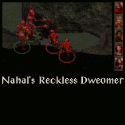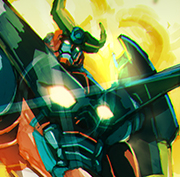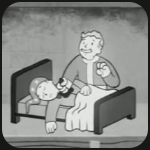|
greatn posted:I'm not sure I understand the whole xp budget thing. If the multiplier doesn't effect the earned xp, why are you supposed to use it? I've just been flat adding all monsters together and dividing by number of players. I'm not sure if the multiplier doesn't affect the earned xp. By the way the Basic D&D DM pdf works, I don't think it ever really says that monsters award xp at all.
|
|
|
|

|
| # ? May 11, 2024 15:16 |
|
Sage Genesis posted:I'm not sure if the multiplier doesn't affect the earned xp. By the way the Basic D&D DM pdf works, I don't think it ever really says that monsters award xp at all. That part's right there in the text. The same sentence also kind of hints that characters gain xp for beating monsters. quote:3. Adjust Encounter XP Value Based on the Number of Monsters. Based on the number of monsters in the encounter, multiply the encounterís XP value by the matching multiplier from the Encounter XP Multipliers
|
|
|
|
AlphaDog posted:That part's right there in the text. The same sentence also kind of hints that characters gain xp for beating monsters. Oh there it is. Man, that is dumb. I think my brain forced my eyes to gloss over that part for self-preservation.
|
|
|
|
greatn posted:I'm not sure I understand the whole xp budget thing. If the multiplier doesn't effect the earned xp, why are you supposed to use it? I've just been flat adding all monsters together and dividing by number of players. I think it's trying to factor for the extra action economy of multiple monsters. It should either raise the reward to players or not be a thing at all. In theory basing the difficulty and reward around encounter specifics isn't a bad idea, but when the monster math is already jacked up it becomes 'garbage in, garbage out'. They might as well raise the encounter XP for ambushes, terrain favorable to the monsters, and other tactical elements that increase difficulty. But 5e won't do any of that.
|
|
|
|
OK, so "Add monster xp together, divide by number of players" is actually the correct way to award experience then? The difficulty rating is a seperate mechanic entirely(still using exp as a reference) just for the gm to determine how hard her encounter is so it can be tweaked one way or another. Is that correct?
|
|
|
|
greatn posted:OK, so "Add monster xp together, divide by number of players" is actually the correct way to award experience then? The difficulty rating is a seperate mechanic entirely(still using exp as a reference) just for the gm to determine how hard her encounter is so it can be tweaked one way or another. Is that correct? How to award XP isn't actually a written rule yet, but it does specifically say not to award the 'extra' xp you get when multiplying for encounter difficulty. So yeah, I guess you're doing it right. Elector_Nerdlingen fucked around with this message at 14:08 on Oct 6, 2014 |
|
|
|
AlphaDog posted:Yes, that's right. Oh ok. I see that is a problem for a lot of people creating balanced encounters, but honestly I've always winged it when it comes to encounters and if I gently caress up and make a situation where I'm going to kill a few people through no fault of their own I'll wing an exit or a way to get out of the encounter alive for them. That's very rare though. I've put together a number of encounters so far that would fall under "Deadly" on the scales mentioned here but I think these books vastly overestimate monster strength because these encounters have been easily swept up for the most part. Only one close to deadly was when some player characters tried a really dumb stunt I said would probably fail and gave them the DC ahead of time. I just approach things from a far more improvisational stance, and apparently so did the designers.
|
|
|
|
greatn posted:I just approach things from a far more improvisational stance, and apparently so did the designers. Then they shouldn't have provided a system in the first place. Plenty of games use a fairly relaxed, improvisational stance. That's fine. Some games simply place opposition based on what makes sense in the game world for there to be, balanced encounters be damned. That's also fine. Different approaches for different styles. But you shouldn't make a whole system, complicated enough to need multipliers with fractional numbers, and then take the stance that you're not actually supposed to trust or use it. If you make a system, go and do it well. Anything less means you didn't do your job.
|
|
|
|
Yeah, I mean, I can (and do) improv/make up my own poo poo for free. It's pretty fun. Idk why you'd need/want to buy a bunch of books if you're gonna go that route though.
|
|
|
|
I just mentally replace all of the non-title non-flavor text in all rulebooks with the phrase "gently caress it, just do whatever" repeated over and over and every single game is exactly the game I want it to be.
|
|
|
|
I'm just saying this specific mechanic you're complaining about just isn't relevant to me. The majority of what I use co end straight from the books, in terms of stat blocks, abilities, etc. If you're really concerned about creating really balanced encounters that's a problem and it really sucks, I don't disagree.
|
|
|
|
AlphaDog posted:How to award XP isn't actually a written rule yet, but it does specifically say not to award the 'extra' xp you get when multiplying for encounter difficulty. So yeah, I guess you're doing it right. It's kind of implied through a small bit of reverse engineering. A CR 1 monster nets you 200 exp, and the game assumes a Medium difficulty encounter for a four man party is 50 exp. A CR 1 vs. a Four man Level 1 Party is Medium difficulty, so you can see that it's 200 divided by 4 to get 50. However, the "Adventuring Day" baffles me. It mentions an expected adventuring day for a party of Level 1 adventurers will net a single PC 300 exp total, or, 6 encounters of Medium difficulty. This holds water with the previous formula (50 exp for a Medium encounter * 6 encounters of Medium difficulty = 300 total exp to a single PC). BUT, I don't see a party actually being able to fight that many encounters in a single day in 5E. Especially at Level 1. Damage to HP is likely to be too swingy for that to actually be the case. I'd estimate 3-4, tops, before the party has to stop and rest for the night. I mean, you could rarely even swing more than 4 encounters a day in 4E, and the PCs are designed to be more resilient there than in 5E. The only way I can see it is if the Cleric is absolutely nothing but the heal bot, but even they only get 2 spells at first level. This also breaks down how stupid the encounter building system is even further because it doesn't dip into what the expected adventuring day is for any party LESS than 4 PCs. If you follow the CR formula you can kind of gauge it, but it means that parties of less than 4 characters will advance through experience levels SLOWER than those of 4 and above. Which is DUMB. You see, the entire point of having an exp pool is so that you can easily gauge "X Encounters = 1 experience level's worth of exp" and have a party of any size both have the same types of challenges as each other and advance through levels at the same rate. Take, for example, the 4E encounter building rules. It was based entirely upon how many PCs are in the party first and foremost and exp rewarded was directly and proportionally tied to how many enemies the party faced. For a first level party, the exp gained for an encounter of the party's level was 100 exp to each PC regardless of however many PCs were actually in the party. A single Level 1 enemy was worth 100 exp. If you had a four man party in which everyone was Level 1, you fought four enemies, each worth 100 exp, and when the encounter is complete everyone gets 100 exp. If it was a three man party, you faced three enemies instead. Five? Five enemies. In order to advance to Level 2, the PCs need 1000 exp. Therefore, 10 encounters of the party's level equals an entire level's worth of exp. Easy, right? Maybe you want to mix it up and have more or less enemies but have the encounter worth the same exp and thus the same amount of difficulty? That's simple too! There are different "tiers" of same leveled enemies that net you more or less exp because they are either given a slight boost in power over standard enemies (Elites, Solos) or are meant to be large groups of enemies that go down if you so much as breathe on them, but can still be a threat because together they're meant to be as powerful as a standard monster (Minions). A four man Level 1 Party could face a Level 1 Elite (200 exp), a standard Level 1 enemy (100 exp) and four Minions (25 exp each). That's six enemies of varying degrees of difficulty worth the same amount of exp because together their numbers actually mean something. Now compare it to what 5E did. Which seems easier and more logical to work with?
|
|
|
|
I think for number of encounters you are neglecting traps and skill based encounters. In my experience it actually has hashed out to about three or four combat encounters expending most party resources, but there also being a trap or two, or a puzzle, or a "skill challenge" for lack of a better term. What you're describing actually sounds really weird to me. Reality constantly warping around adventurers to make sure they always advance at exactly the same rate and face the exact same level of challenge. greatn fucked around with this message at 15:48 on Oct 6, 2014 |
|
|
|
From our experience with the sample adventure, it's possibly because being outnumbered is a pretty big deal. With the flat number distributions the chance of having a party member who can trivially take everything a monster group can dish out is much less, especially at low level. Some reviews have reported TPK's from the initial encounter of the sample adventure (four goblins), especially with the starting characters. Meanwhile we found a silly problem with the backgrounds in that our Bard, with the Entertainer background, could only get a maximum of +5 to Perform meaning he has a fairly strong chance of failing to perform anything successfully. He went ahead and used the Bard background ability to get free board and lodging in exchange for his performance then rolled a 2 on his Perform check and was humiliated in front of the audience. We then noticed that this happens for many of the backgrounds, such as the Criminal and Charlatan who can barely break the law. Moreover, taking these with any class other than Rogue is ridiculous as you'll surely not have the modifier to be any good at what your background is supposed to be about..
|
|
|
|
greatn posted:I think for number of encounters you are neglecting traps and skill based encounters. In my experience it actually has hashed out to about three or four combat encounters expending most party resources, but there also being a trap or two, or a puzzle, or a "skill challenge" for lack of a better term. Yes, it is true I didn't mention story rewards or skill challenge rewards. However, traps in 4E are treated as monsters and have the same rules as monsters when it comes to encounter building. See, you COULD create an encounter that is nothing but traps if you wanted to, and it'd net you the same amount of exp as if you were fighting some dudes. Skill Challenges are somewhat different than combat encounters, though they too have Level based exp gain. They are also generally worth considerably less exp than a combat encounter, so it usually maths out to 4 challenges = 1 combat encounter. Usually. You can manipulate this though the same way you can for combat encounters. The key word is encounters though, as ANYthing that gives you exp in any way shape or form is an "encounter" by 4E standards. You're not expected to actually have to fight 10 combat encounters of party level to gain a level because you're expected to face skill challenges and gain story rewards too, and you are right on the money when you say around 3-4 combat encounters a level is to be expected. Note, too, that in my explanation I was solely focusing on encounters of a party's level, in this case Level 1. The rules for raising or lowering the encounter level, and thus netting you more or less experience are just as easy to deal with though. All it does is increase or decrease the exp pool depending on the level you intend for the encounter. There's nothing stopping you from say, adding a Level 2 enemy in a Level 1 encounter, either. the Level 2 enemy will just take up 125 exp instead of 100. So in my example where we mix an Elite, a Standard and four Minions, you COULD, say, Have a Level 1 Elite (200 exp), a Level 2 Standard (125) and 3 Minions (25 exp each). This would still be a Level 1 Encounter. Say you wanted to make it a Level 3 encounter for a Level 1 party, which is getting pretty up there in terms of difficulty vs. player survivability. For the example's four man party you'd have a 600 exp pool to allocate to enemies. Therefore, you could have them fight three Level 1 Elites alone (200 exp each, 3 * 200 = 600) and it'd turn into a Level 3 encounter. If they beat it, each PC gets 150 exp, which is the same amount of exp they would have gotten had they been 3rd Level and fought four standard Level 3 enemies. The point is that encounter building in 4E is flat across the board with repeatable and reliable results in difficulty that net you proportionate exp gains that only require you to pay attention to the exp pool rather than bend over backwards with some kind of crazy calculus.
|
|
|
|
greatn posted:What you're describing actually sounds really weird to me. Reality constantly warping around adventurers to make sure they always advance at exactly the same rate and face the exact same level of challenge. Oh no! Reality... warping!? How do you feel about magic? How do you feel about literal gods directly intervening in the lives of mortals? Setting aside 'magic', how do you feel about dragons being able to fly, giant insects being able to respirate, giant humanoids being able to jump, invisible creatures being able to see or mundane humans recovering from brink-of-death injuries in hours?
|
|
|
|
greatn posted:What you're describing actually sounds really weird to me. Reality constantly warping around adventurers to make sure they always advance at exactly the same rate and face the exact same level of challenge. It's more of a tool to manage expectations and keep the DM from accidentally wrecking the campaign. What it accomplishes is that the DM can go balls-out trying to obliterate the PCs, and the fights don't involve monsters pulling their punches, inexplicably running away, or DMPCs showing up in the nick of time to save everybody. That crap's jarring for everybody, and actually worse since it telegraphs that encounters aren't well designed, but it doesn't matter since the DM's safety net will always let you win anyway.
|
|
|
|
One of the irregulars at my gaming group has picked up a copy of 5e and has made some noncommittal noises about running it. I burned myself out on several years of various 3.5 campaigns, would it be worth my time to come back for the 5e game to play a mariachi valor bard hand-crossbowman necromancer, so that I can be a traveling dia de los muertos skeleton fiesta? I'm not really interested in the system and the group can be pretty meh, but I don't get the opportunity to be quite so 'out there' with my characters this often, and I'm feeling kind of tempted.
|
|
|
|
moths posted:It's more of a tool to manage expectations and keep the DM from accidentally wrecking the campaign. What it accomplishes is that the DM can go balls-out trying to obliterate the PCs, and the fights don't involve monsters pulling their punches, inexplicably running away, or DMPCs showing up in the nick of time to save everybody. Or the party can run away from a clearly bad matchup rather than expect that every encounter can be beaten and set up perfectly for their current power level. Then come back later with a plan. Not to mention that it's good to remember that most humanoids would probably not fight to the death if they can avoid it. Creatures might only take one person, if they're trying to eat someone. Another might only chase someone as far as their disturbed lair. The game has a lot of glaring flaws, but people are pretending that other editions didn't have their own on launch. Edition wars is getting old really fast.
|
|
|
|
Crasical posted:One of the irregulars at my gaming group has picked up a copy of 5e and has made some noncommittal noises about running it. I burned myself out on several years of various 3.5 campaigns, would it be worth my time to come back for the 5e game to play a mariachi valor bard hand-crossbowman necromancer, so that I can be a traveling dia de los muertos skeleton fiesta? If you know the DM/players and think you'll have fun playing with them, go for it. 5e's not unplayable, and as with just about every other RPG the other people around the table will be more of a factor in whether you have fun or not than the rules will. Talmonis posted:The game has a lot of glaring flaws, but people are pretending that other editions didn't have their own on launch. Edition wars is getting old really fast. Who's doing this?
|
|
|
|
Talmonis posted:Or the party can run away from a clearly bad matchup rather than expect that every encounter can be beaten and set up perfectly for their current power level. Then come back later with a plan. Not to mention that it's good to remember that most humanoids would probably not fight to the death if they can avoid it. Creatures might only take one person, if they're trying to eat someone. Another might only chase someone as far as their disturbed lair. You expect PCs to run away when every monster and its mother will outspeed the PCs, or in fact punish them for trying to run away in the first place?
|
|
|
|
Talmonis posted:Or the party can run away from a clearly bad matchup rather than expect that every encounter can be beaten and set up perfectly for their current power level. Then come back later with a plan. Not to mention that it's good to remember that most humanoids would probably not fight to the death if they can avoid it. Creatures might only take one person, if they're trying to eat someone. Another might only chase someone as far as their disturbed lair. Running away from a bunch of fights doesn't really sound fun. I mean isn't that the point of this whole thing? Having fun.
|
|
|
|
Discussion of a system involves more than flopping on the turf and crying "edition war." Lots of recent games have included some kind of encounter-building tool, and the better ones generate better encounters. The expectation that the heroes are going to face total destruction and the "right answer" is running away is rail-roady as gently caress, man. It works in hex-crawls or wannabe rogue-likes, but there's no reason to make that default by having an inadequate/worthless system to prevent it.
|
|
|
|
I've been pondering how to bring something along the lines of the 4e minion rules to 5e. The easiest way to do it, given that all monsters now work under bounded accuracy/damage, is to take the enemies you want to make minions, give them 1 HP, and say "BOOM! These are minions!" But I was also trying to figure out how to do it within the bounds of 5e's structure, given the fact that a fair number of people who might normally be favorably inclined to a minion-type mechanic freak the hell out at the concept of "1 HP monsters". So how about something like the following? Optional Mook Rules As characters advance in level, their skills advance to a degree that their blows overwhelm the defenses of lesser foes, dealing mortal damage. Starting at fifth level, when a PC succeeds on an attack roll for an attack that would deal damage, or a monster fails a saving throw on a player spell or ability that would deal damage against an enemy of CR (Player level/5) or less, that enemy is reduced to 0 HP. This does not apply if the damage type is one that the monster has resistance or immunity to. Edited to add that last sentence So at 5th level, things like orcs and hobgoblins would be minions. At 10th level, ogres and such would be minions. And so on and so foth. The idea here is for a scaling ability to create cinematic battles with lots of minor enemies that still pose a threat without bogging things down. I'm personally fine with the "1 HP" solution, but I think this might appeal to people who get the vapors at any mention of 4e mechanics. Thoughts? Verklemptomaniac fucked around with this message at 17:10 on Oct 6, 2014 |
|
|
|
EDIT: On mooks - I think your idea is fine; a similar thought I had was to deal damage in terms of entire hit dice.Talmonis posted:Or the party can run away from a clearly bad matchup rather than expect that every encounter can be beaten and set up perfectly for their current power level. Then come back later with a plan. Not to mention that it's good to remember that most humanoids would probably not fight to the death if they can avoid it. Creatures might only take one person, if they're trying to eat someone. Another might only chase someone as far as their disturbed lair. It might be difficult to telegraph this to players before they lose someone, or even before all of them die. It's one thing to put a Troll in a room and expect the level 1 party to think their way around him. It's quite another to already be fighting an encounter and getting the party to realize that they can (or rather, should) beat a retreat. As well, having the party lose a fight and having to tackle it again would seem to me like the combat equivalent of a lock failure: "you failed, nothing happens, do something else" There's also the issue of trying to 'sell' the unspoken word to the party that you really only killed one of them as part of the plot and not because you're trying to let them eke out a draw/minor loss. gradenko_2000 fucked around with this message at 17:14 on Oct 6, 2014 |
|
|
|
Talmonis posted:Or the party can run away from a clearly bad matchup rather than expect that every encounter can be beaten and set up perfectly for their current power level. Iunno, I'd be a little frustrated if my dm plopped down a goblin horde encounter we couldn't beat when we're on a quest to save captured villagers before they get sacrificed to the gobbo god. Oh well, guess we can't do that, what's next? Ah, a quest to save a princess from a dragon, okay. Oh, the dragon killed 3/4ths of the party with its breath. Um, guess we couldn't do that either? How is anyone supposed to know what is or isn't a good fight if they're new to the game/system?
|
|
|
|
Jack the Lad posted:Oh no! Reality... warping!? Dragons have helium sacs and birdlike bones, the world is much more oxygen rich allowing the survival of large insects and dinosaurs, giant humanoids have springy bones, invisible creatures are not really invisible it is an illusion and mind trick, hit points are an absteaction it turns out that chest wound was merely a graze lucky you.
|
|
|
|
Real talk: If you plop down an unbeatable encounter and haven't stated, before the very first session, that you WILL be chucking unwinnable fights at the players, you are a lovely GM. If you don't additonally warn, explicitly, out of character and directly to your players that a certain encounter has a jacked up difficulty, you are 'merely' a bad GM. I don't play D&D to be a shitfarmer. My default assumption is that I can, should, and will do several impossible things before breakfast and that if I play my cards right, nothing stops me from slaying a god at level 6 (or 10 in 4e). If you dropped a gotcha, bullshit instant kill or unwinnable battle on me without warning I'd stand up, say 'it's been fun guys' and leave your table, because we're not there to play the same game. Don't assume that 'surprising' players with dumb broken fights is fun or amusing to anyone except you.
|
|
|
|
greatn posted:Dragons have helium sacs and birdlike bones, the world is much more oxygen rich allowing the survival of large insects and dinosaurs, giant humanoids have springy bones, invisible creatures are not really invisible it is an illusion and mind trick, hit points are an absteaction it turns out that chest wound was merely a graze lucky you. If you puncture a dragon's helium sacs can it still fly? How much more fiercely does fire burn than on earth because of the increased O2? Can I make armour/buildings/boats out of the springy bones and what properties do they have? Does mind-trick invisibility still work on mindless undead/constructs? I don't understand how you can come up with justifications for these things but not for a party of adventurers facing encounters/enemies appropriate to their abilities.
|
|
|
|
Verklemptomaniac posted:I've been pondering how to bring something along the lines of the 4e minion rules to 5e. The easiest way to do it, given that all monsters now work under bounded accuracy/damage, is to take the enemies you want to make minions, give them 1 HP, and say "BOOM! These are minions!" Seeing as I highly doubt 5E will ever have Minion rules, you don't need to get that elaborate. Just make 1 HP Monsters and nuts to anybody who gets heebie jeebies for mixing a good idea from a previous edition that should have been in the newer edition in the first place. The trick, however, would be to figure out what amount of exp to have these said minions dole out, and to be honest I couldn't really tell you because the CR system is so loving borked.
|
|
|
|
Transient People posted:Real talk: If you plop down an unbeatable encounter and haven't stated, before the very first session, that you WILL be chucking unwinnable fights at the players, you are a lovely GM. If you don't additonally warn, explicitly, out of character and directly to your players that a certain encounter has a jacked up difficulty, you are 'merely' a bad GM. I don't play D&D to be a shitfarmer. My default assumption is that I can, should, and will do several impossible things before breakfast and that if I play my cards right, nothing stops me from slaying a god at level 6 (or 10 in 4e). If you dropped a gotcha, bullshit instant kill or unwinnable battle on me without warning I'd stand up, say 'it's been fun guys' and leave your table, because we're not there to play the same game. Don't assume that 'surprising' players with dumb broken fights is fun or amusing to anyone except you. I actually agree with you. The GM we have will add various (well telegraphed by setting, such as burned victims, stone statues, etc.) harder encounters that we really shouldn't be screwing with as an incentive to come back later. Not that we ever do, we just tend to wing it, and win anyway. Level 2 characters killing a ghost with no magic weapons (and our mage with only necrotic or frost spells) for example, with a suitably awesome reward . But he leaves us the ability to run. Which we have used on occasion, and I don't think that's a bad thing.
|
|
|
|
Transient People posted:Real talk: If you plop down an unbeatable encounter and haven't stated, before the very first session, that you WILL be chucking unwinnable fights at the players, you are a lovely GM. If you don't additonally warn, explicitly, out of character and directly to your players that a certain encounter has a jacked up difficulty, you are 'merely' a bad GM. I don't play D&D to be a shitfarmer. My default assumption is that I can, should, and will do several impossible things before breakfast and that if I play my cards right, nothing stops me from slaying a god at level 6 (or 10 in 4e). If you dropped a gotcha, bullshit instant kill or unwinnable battle on me without warning I'd stand up, say 'it's been fun guys' and leave your table, because we're not there to play the same game. Don't assume that 'surprising' players with dumb broken fights is fun or amusing to anyone except you. It is pretty hard to argue with you about that as it is a perfectly reasonable attitude to take. It seems like Next has the problem that it is pretty easy to accidentally do it, if you are not paying super close attention to the encounters. (Or not willing to fudge it in play.)
|
|
|
|
ocrumsprug posted:It is pretty hard to argue with you about that as it is a perfectly reasonable attitude to take. It seems like Next has the problem that it is pretty easy to accidentally do it, if you are not paying super close attention to the encounters. (Or not willing to fudge it in play.) Yes, that's pretty much exactly the problem - the CR assignments aren't well calibrated to the actual lethality of a monster, so making a fight that's easy, or difficult or just-right for any given party is anybody's guess.
|
|
|
|
Yeah, agreed. Nobody wants perfectly same-y encounters. People want functional encounters. If the party is outmatched it should be by intention, not because tummyfeels math underestimating brain puppies and giant crabs.
|
|
|
|
The whole "just run away if you're not going to win" thing doesn't really work either, since tons of monsters have more mobility than party members, and that isn't taken into account at all in monster design.
|
|
|
|
Running away doesn't work because 5e combat is rocket tag. Tag, you're already unconscious. You can get back up again just as quick but if the party decides to run they will leave people to die. What these games need is a "con" system like mmos have. A mechanic to tell ahead of time "this thing will kick our rear end." In video games they literally get a skull icon or names in red text. Having that would require valid CR levels.
|
|
|
|
Gort posted:The whole "just run away if you're not going to win" thing doesn't really work either, since tons of monsters have more mobility than party members, and that isn't taken into account at all in monster design. Plus the whole 'I didn't know I wasn't going to win until this very turn, when we are all almost completely hosed before getting the chance to do anything about it'. Yaaaay
|
|
|
|
Verklemptomaniac posted:This does not apply if the damage type is one that the monster has resistance or immunity to. Edited to add that last sentence Minor thing, but wouldn't this effectively make resistances into outright immunities?
|
|
|
|
I imagine by the time everyone realizes the fight is turning south, TPK is imminent.
|
|
|
|

|
| # ? May 11, 2024 15:16 |
|
XP rewards is like the one place where the whole verisimilitude argument will never, and should never, take hold. All XP gains are meta. They don't even try to model anything. Oh sure abstractly they model how quickly your character goes from green farmer to special ops, but that's it. 4e's encounter design was brilliant. Probably one of the best in the industry, and I would hope it would be the one thing the grogs can't really fault it for. If you know that a monster of level X has f(X)AC, HP, and Defenses, + or - several points for role and flavor, then you know how challenging that monster actually is, which is the whole loving point of monster levels. If CR or HD or whatever doesn't tell you how hard a monster is, why the hell do we even have those systems? Then you've got the budget. All XP systems are equally arbitrary, so one that assures you will pick the correct number of monsters as appropriate to the party baseline is better than one that gives you no insight whatsoever into how many monsters to use. I remember during the Great Edition Wars sometimes we'd get somebody who was angry that you couldn't build 'inapprorpiate' encounters in 4e, but you could. Nobody comes to your house and breaks your knees if you build an encounter above the XP budget - but you know instantly that you've done so. It is better to be able to build an 'inappropriate' encounter if you want to than it is to stumble into one by mistake. It does get stale to build perfectly balanced encounters session after session. Fortunately, that's not what anybody did.
|
|
|


























